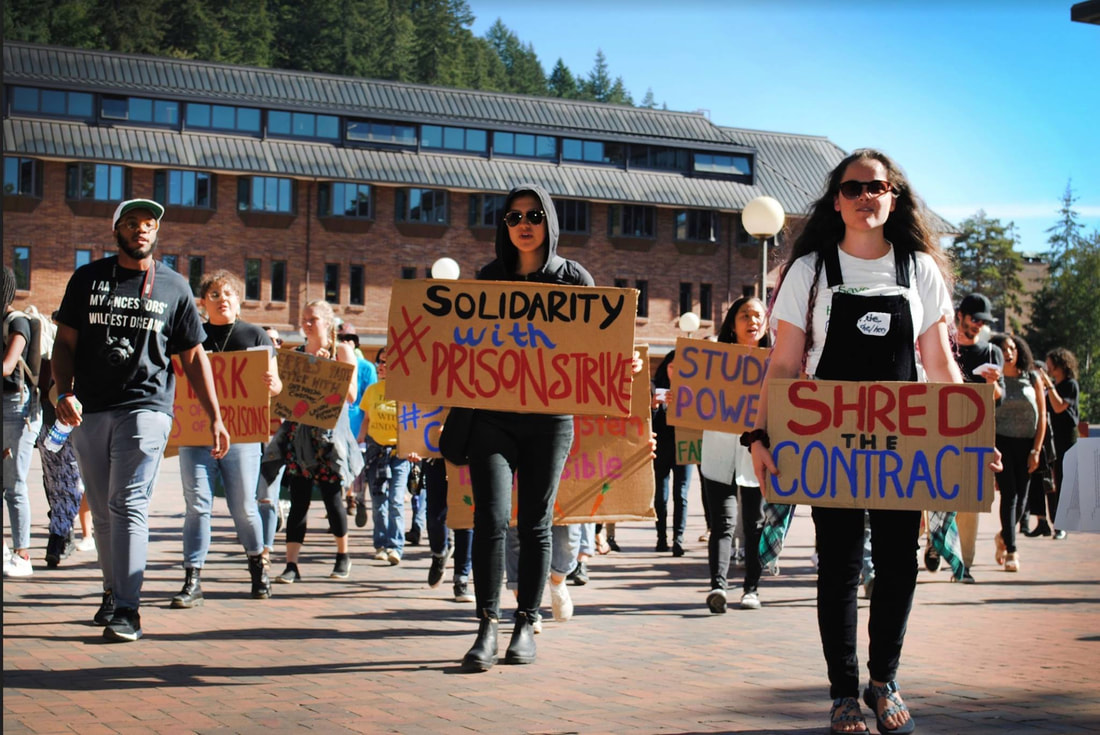 Author: Marii Herlinger, WPJC Intern Students of Western Washington University are calling for an end to the university’s contract with its food vendor Aramark. Beginning with a petition and letter addressed to WWU’s President Sabah Randhawa and Director of University Residences Leonard Jones in May of 2018, students requested that the university move toward a self-operated dining system. The petition, which was drafted by a campus organization by the name of Students for Sustainable Food, garnered more than 1,700 signatures. The momentum, however, did not stop there—the issue gained enough student support to warrant the creation of a separate committee branching off from Students for Sustainable Food: called Shred the Contract. Supporters of the Shred the Contract movement have cited several reasons for their urgency in dropping Aramark. Most important, as I believe they would concur, is the food vendor’s strong connection to the prison industrial complex. Operating in over 500 prisons across the country, Aramark profits off of the cheap labor found among a disproportionate number of BIPOC* inmates. Those students speaking out against a renewed contract with Aramark understand the need to abolish this system of white supremacy and racist exploitation. Western’s current contract with Aramark ends in 2021. Students have taken to Red Square with signs and voices of protest this February, and are engaging in university-officiated forums with their sights set on a self-operated dining service to replace Aramark. As hopeful as 1,700 petition signatures sound, the prison-industrial complex is a deepset institution — it can be difficult to imagine it going away anytime soon. Being only ever one person at a time, we are apt to feel powerless. But I am uplifted by the thought that within our community, young people are recognizing the power they have to demand reform. They are serving up a much-needed reminder that change at a local level is not only possible but crucial in achieving change on a larger scale. *BIPOC = Black Indigenous People of Color (Be sure to follow Shred the Contract on Facebook for updates on events and actions.) Links for more info & action items: Direct link to the Shred The Contract Petition: https://actionnetwork.org/petitions/shredthecontract?fbclid=IwAR0rqggWDHqhesSW-7zWMqWhpEKO7PCV2i-x2S0dfhNk0VOZQV3wyQz8Mic Info alert for last round of university forums (November 2019): https://calendars.wwu.edu/food-justice-forum Article from The Western Front about the beginning of the Shred the Contract movement: https://www.westernfrontonline.com/2018/05/16/students-push-western-to-shred-the-contract-with-aramark/ Categories All Some very good news today.
BPD Chief Cook listened to the privacy concerns of the majority of City Council, and the community comments at large and committed to not pursuing a Data Collection software program with BPD grant money. He deserves a thank you from the community because technically he didn't have to follow council's recommendation. A+ for privacy and thanks to those who stayed late to speak! Thanks due as well to those Council members who concern themselves with privacy, potential abuse and corporate data collection. (Submitted by Janet M.) (Submitted by Karen Weill & Larry Hildes)
We're asking people who are concerned about the increase in spying in our society to please come to the City Council meeting this Monday, July 7th, at 7 p.m. (6:30 p.m. to sign up to speak), in order to speak out against the City buying this new software that they claim will simply make officers and the community safer, but that is so wide open for abuse as to drive a truck through the opening. City Council meeting 7 p.m. Monday, July 7th City Council chambers, 201 Lottie St. (behind the downtown library) Intrado is a software that was developed in partnership with the same company that provides the software for 9-1-1 calls. What it does is search the internet based on a series of parameters that have been given for the search, and pops up with any kind of information for a particular person or location where you request information. So, if anyone in that particular house has ever been arrested or convicted of a crime that information will come up. (BPD states they will only ask for crimes of violence, such as assault or homicide.) BPD can give us the parameters they intend to ask to limit the searches for. But in a meeting with a representative today, they could not give us the parameters that the company, Entrado itself, uses in developing the so-called "threat score." Deputy Chief Doll said that was proprietary information. Given that this is a private company, they are not subject to the same Public Records Act (state equivalent to Freedom of Information Act requests) that government agencies are subject to, so unless the company is forced to give this information to the City Council as part of the buying process now being considered, we may never know how these threat scores are developed. As part of the concern: We do know that Intrado's threat score is partially based on social media statements. If someone has made any threatening statements on the internet, that goes into the score. But who knows how much weight is given to this? So someone who rails against the government or against police abuse, can they expect that if they call 9-1-1 or someone calls 9-1-1 about them, that they will be facing guns drawn because of the Intrado score? Just because the department has assured us they can set up strict guidelines for its use currently, doesn't mean it will stay that way. When we asked Dep. Chief Doll how the department will maintain those safeguards after he leaves, he simply said that once an ethical culture has been set up in an organization, it tends to continue. We also don't know what the company does with the information that gets gathered. The company maintains records on all searches done by BPD -- but Dep. Chief Doll did not know if Intrado, again a private company not subject to FOIA or PRAs, maintains the information resulting from a search in its own servers. While there are many good police officers in the BPD, there are also officers who have shown they cannot be trusted. BPD overall has a good record with us, but I would be shocked if there aren't officers who would misuse this information. The search engine can establish next of kin and associates, which invites targeting of whole groups of people in ways they cannot do now. There are so many ways this is set up for abuse, no matter the best intentions of the department. We believe that this is first step on a slippery slope to further eroding the last of the civil liberties, particularly our privacy, that we have left. It isn't just happening at the federal level folks -- now they want to develop this at the local level, too. The times that this may help in an occasional situation doesn't justify the loss of privacy and civil liberties that the rest of us will experience. Please come to the City Council meeting this Monday, July 7th, at 7 p.m., to hear the staff report and express your opinion about this software. Sincerely, Karen (Weill) and Larry (Hildes) Read the Grant submission to the Bellingham City Council You can reach all members of the Bellingham City Council with this form |
Contributors
We invite the WPJC community to contribute fact-checked submissions on local, national and global current events. Linking to original sources and articles is required. Submissions may be sent to [email protected] for review. Categories
All
Archives
May 2024
|


 RSS Feed
RSS Feed